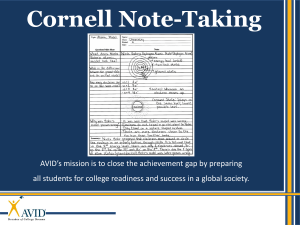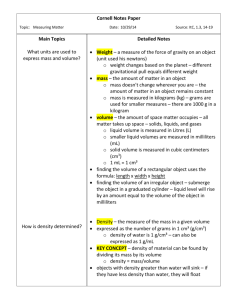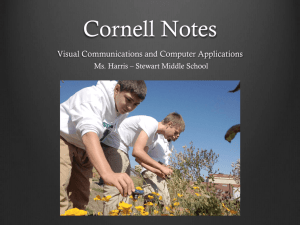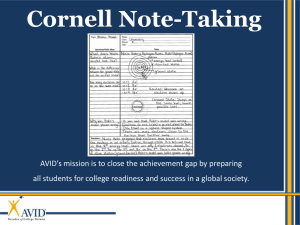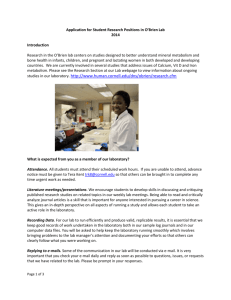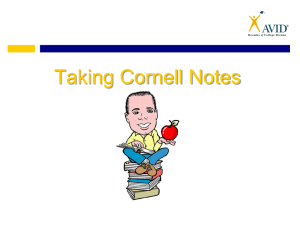Inside Higher Ed
advertisement
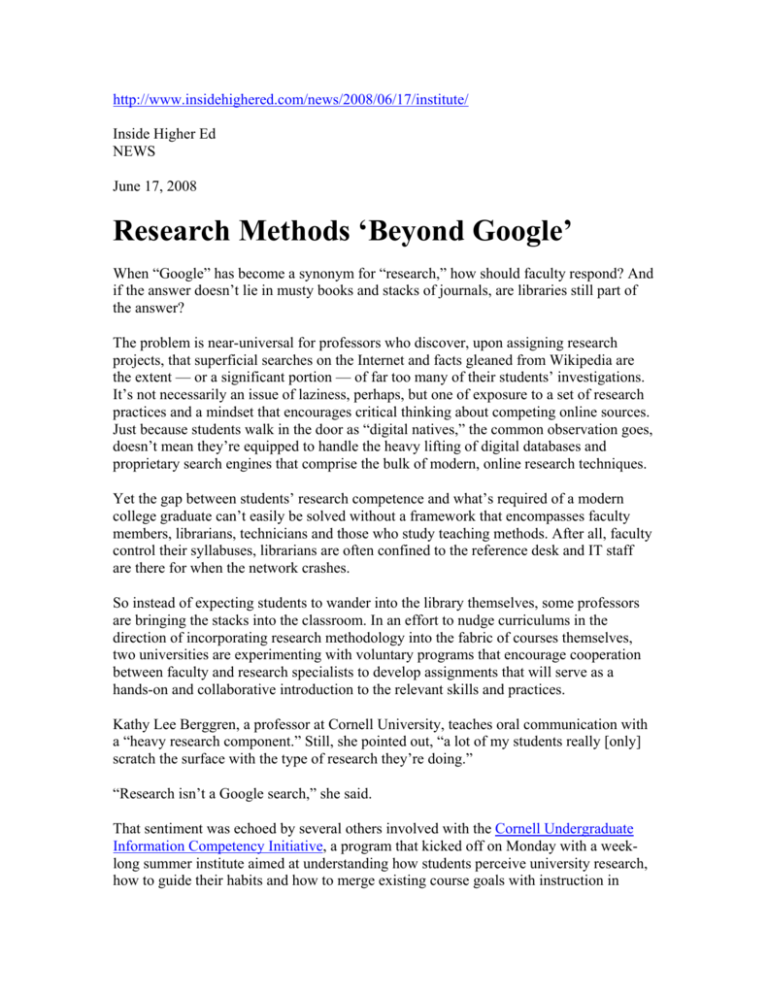
http://www.insidehighered.com/news/2008/06/17/institute/ Inside Higher Ed NEWS June 17, 2008 Research Methods ‘Beyond Google’ When “Google” has become a synonym for “research,” how should faculty respond? And if the answer doesn’t lie in musty books and stacks of journals, are libraries still part of the answer? The problem is near-universal for professors who discover, upon assigning research projects, that superficial searches on the Internet and facts gleaned from Wikipedia are the extent — or a significant portion — of far too many of their students’ investigations. It’s not necessarily an issue of laziness, perhaps, but one of exposure to a set of research practices and a mindset that encourages critical thinking about competing online sources. Just because students walk in the door as “digital natives,” the common observation goes, doesn’t mean they’re equipped to handle the heavy lifting of digital databases and proprietary search engines that comprise the bulk of modern, online research techniques. Yet the gap between students’ research competence and what’s required of a modern college graduate can’t easily be solved without a framework that encompasses faculty members, librarians, technicians and those who study teaching methods. After all, faculty control their syllabuses, librarians are often confined to the reference desk and IT staff are there for when the network crashes. So instead of expecting students to wander into the library themselves, some professors are bringing the stacks into the classroom. In an effort to nudge curriculums in the direction of incorporating research methodology into the fabric of courses themselves, two universities are experimenting with voluntary programs that encourage cooperation between faculty and research specialists to develop assignments that will serve as a hands-on and collaborative introduction to the relevant skills and practices. Kathy Lee Berggren, a professor at Cornell University, teaches oral communication with a “heavy research component.” Still, she pointed out, “a lot of my students really [only] scratch the surface with the type of research they’re doing.” “Research isn’t a Google search,” she said. That sentiment was echoed by several others involved with the Cornell Undergraduate Information Competency Initiative, a program that kicked off on Monday with a weeklong summer institute aimed at understanding how students perceive university research, how to guide their habits and how to merge existing course goals with instruction in research methods. Those practices, of course, can apply whether inside a brick-andmortar research facility or logged on from home. The goal is to “really learn how to use a library whether they’re in it or not,” Berggren said. Each of nine faculty fellows, including Berggren, will join an “implementation team” consisting of a librarian, someone from the information technology staff and a representative from Cornell’s Center for Learning and Teaching with the “objective of infusing information competency skills into the coursework,” said Thomas Mills, a cochairman of the program who teaches online legal research at the Cornell Law School. Those teams will continue to meet over the next semester to monitor how the course is progressing and evaluate research-based assignments. “It’s certainly one way to encourage faculty who probably were taught in a very lecturestyle format and have grown up in a largely lecture-style format — maybe augmented by PowerPoint — to share with undergraduates the genuine excitement of what learning in a university is all about, and that does involve research,” said Tracy Mitrano, the director of Cornell’s Computer Policy and Law Program and, like, Berggren, both a faculty fellow and an institute facilitator. “It might also involve service....” Mitrano incorporated what she calls “active learning” techniques into her course on the culture, law and politics of the Internet, an experience one of her former students, now a teaching assistant, will discuss this week at the institute, she said. When she brought up the music recording industry’s anti-piracy tactic of sending “pre-litigation letters” to colleges, “the room erupted,” she remembers. To bring in real-world concepts and to encourage collaborative research, she broke the class into groups, each of which was assigned a different project: on the history of piracy, on current issues, on new business models for music, protest movements and other topics. “Man, they woke right up,” Mitrano recalled. “I didn’t see any more yawns.” An instructor “winds up learning so much that it’s an enormous benefit to them, and moreover, it reminds them of why they wanted to be in higher education in the first place, because it’s all about this process, and it’s exciting.” The germ of the Cornell initiative started with a visit to the University of California at Berkeley last spring, where faculty and librarians learned about the Mellon Library/Faculty Fellowship for Undergraduate Research, which for several years has tested a similar model but on the scale of an even larger research campus, and with funding from the Andrew W. Mellon Foundation. During Berkeley’s accreditation renewal process several years ago, said Elizabeth Dupuis, the project’s director, one of the campuswide goals was to define “what it means to be at a research institution.” Of course, she said, one of the fundamental aspects of that experience was research itself, but not just in lab courses or classes on research methods. “There’s no course that everyone takes, and there’s not really a very clear trajectory for most students,” Dupuis noted. “It’s really important that these skills are taught in the context of a course, and really learning the content and material of a discipline, as opposed to learning these skills separate from a course.” The answer, she said, is “to try to infuse these skills in a wide range of courses” and “work into those assignments the sort of critical thinking skills along the way” — “a net gain of exposure throughout [students’] career.” Berkeley’s Mellon-funded program, renewed after its initial grant for several years, is now in a hiatus phase in which the university is working with external evaluation consultants to conduct focus groups and interviews with participants. Last fall, a modified version of the program was established that focuses on full departments rather than on individual faculty members. But as the trajectory of the program indicates, the movement is from the grass roots rather than from on high, a necessity at large and often unwieldy institutions like Berkeley and Cornell. So for now, the participants in the Cornell institute are “academic guinea pigs,” said Anne Kenney, the university librarian. “[B]eing able to understand the importance of navigating a complex information landscape and being good-quality consumers of content rather than passive receptors of what’s pushed at them is important,” she said. “We know that ... when faculty who have used librarians to provide information competency components in their classes, there has been a concomitant increase in the quality of papers presented.” - Andy Guess

